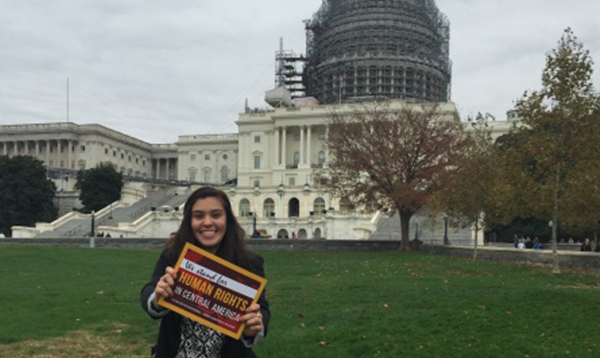By Venezia Hyland (‘17)
That quote, by Sister Helen Prejean, was one of the “nuggets” I brought home from the Ignatian Family Teach-In, a yearly meeting of students from Jesuit colleges and universities from the United States, Canada and Mexico. Ten students and four staff members from Gonzaga spent a November weekend discussing current social justice issues prevalent around the world. Our learning culminated in a day of advocacy, meeting with legislative advisors to members of Congress and speaking on behalf of populations lacking representation in the United States.
You can imagine that immigration reform was a focal point of conversation, along with environmental justice, and U.S. involvement with refugees fleeing from conflict in Central America.
I was overwhelmed not only by the amount of information discussed, but also by a palpable passion emanating from 1,600 Jesuit-educated individuals. Many speakers emphasized our duty as citizens of the globe through the metaphor of building bridges of justice for those who lack access to fundamental resources. As much as I enjoyed this simple metaphor, I was lost in deciphering how I could really connect myself with those that I’m disconnected from. Privilege has given me the opportunity to stand on the balcony and observe the areas where I feel called to serve and advocate. Although I have lived quite comfortably during my 21 years of life, my weekend in DC really allowed me to reflect on those shoulders I’ve been standing on.
As part of the group advocating for unaccompanied minors seeking refuge from Central America, I urged myself to focus on a part of my own history I never paid much attention to before. During our meeting with a legislative advisor for Senator Patty Murray (D-WA), I shared of my mother’s experience living in El Salvador during its civil war. She lived a house away from the church where the Jesuit Monsignor Oscar Romero was assassinated. She heard the gunshots from her yard as he was killed. She walked to school, protecting her younger sister from bodies of neighbors that had been killed the night before. Her family was able to leave the country as violence progress because of their citizenship with the United States. Many others didn’t – and still don’t – have that opportunity.
Sharing this story and hearing others taught me the importance of crucial conversations for any movement toward justice. Everyone has a different opinion in how to better the world, and through dialogue, and the will to understand and attune with others, we can begin to dignify the core worth of each human being on Earth.
During our final night, we celebrated a communitywide mass. Sixteen hundred voices sang with ferocity:
“We are one body, one body in Christ and we do not stand alone”
And it was true. I felt connected not only to the Jesuit university community, but also to those who have, in some way or another, the desire to build bridges connecting all people around the globe.
